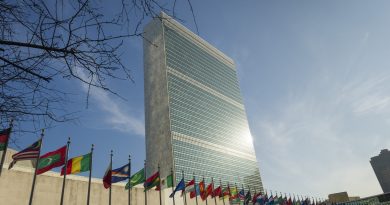The Importance of Youth Voices during the United Nations General Assembly
Erinathalia Reaux
Staff Writer
This past week, the United Nations hosted its 80th General Assembly with the theme “Better Together: 80 Years and More for Peace, Development, and Human Rights.” Students attended several high level meetings on behalf of their student organizations, such as the United Nations Association and John Quincy Adams Society. All the students felt that participating in the events reinforced the belief that youth voices and collaboration are essential for making progress during this critical time in international relations.
On Monday, September 22, Benjamin Barry, a second-year student in diplomacy and international relations, attended the “Empowering Civil Society” conference sponsored by the Center for Civil Society and Democracy and hosted by the American Arbitration Association. Following the significant defunding of Civil Society Organizations (CSOs), this conference aimed to increase collaboration between organizations and discuss sustainable funding mechanisms to ensure that CSOs thrive. Barry had the privilege to speak at the event and when asked how he felt being the youngest person in the room said, “Being [surrounded by] people who are more accomplished than you may seem intimidating at first, [but it also] employs me to do better.”
On Thursday, September 25, Adreanna Dones, a final-year student in diplomacy and international relations, and Neve Walker, a third-year student in the same field, had the privilege of attending the High-Level Meeting to Commemorate the 30th Anniversary of the World Programme of Action for Youth. According to the UN Youth Office, this event brought together UN member states, civil society, youth voices and other stakeholders to, “take stock of what has been achieved over the last 30 years, share good practices and innovations for advancing the implementation of the World Programme of Action for Youth, identify current challenges and actionable solutions [and] chart the way forward through intergenerational collaboration.”
When asked about the event, Dones says, “As a student, it is inspiring to have a seat at the table where these momentous decisions are made.” She also states, “Youth are the bearers of change, and yet are some of the first to be left out of decision-making [where the results] impact them the most.” Attending this event enabled her to see the power of youth voices in advocating for change, which led her to remain optimistic about the future of diplomacy and international relations.
Walker shared similar sentiments to Dones, stating, “Being present in that space reminded me of the power of youth advocacy and the importance of continuing to push for meaningful inclusion of young people in international decision-making.” Both agreed that for there to be positive change now and in the future, youth voices needed to be included in the discussion, which this meeting highlighted.
On Friday, September 26, several students and I attended the Sixth Annual Ministerial Meeting of the Group of Friends of Universal Health Coverage & Global Health, representing UNA-SHU. Led by Thailand, Georgia, and Japan, the meeting served to provide a space to exchange strategies to strengthen health systems and primary care through more innovative and sustainable investments. As each representative spoke, they emphasized the importance of international collaboration when achieving universal health coverage and promoting global health. As one of the youngest people in the room, it was inspiring to be where these discussions are held. It reaffirmed my faith in the international community as countries push for a better future for all.
On Friday, September 25th, both Walker and Barry had the opportunity to attend the Hague Group’s event at the New York Society for Ethical Culture, on behalf of JQAS. The event focused on the ongoing genocide in Gaza and holding those responsible through international law. When asked about highlights from the event, Walker said, “One of the most striking moments was hearing the President of Colombia [Gustavo Petro] speak with moral clarity about the urgency of ending impunity and standing firmly for international justice.” Both commented on the importance of the Hauge Group and similar organizations, and how legal frameworks are not abstract but are directly tied to those facing violence and oppression.
As I interviewed all these students, one perspective kept reappearing: being the youngest person in the room is one of the most empowering yet intimidating feelings. These conversations highlighted the need for youth voices in international affairs because it is our future that is being decided upon. It is essential to keep attending these events and to speak when given the chance because we are the leaders of the future.


